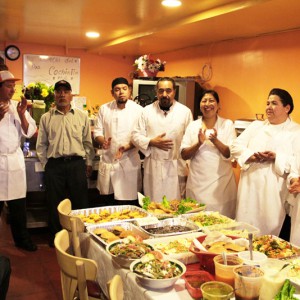Working Together: Putting the Economy in People’s Hands

Today, everyday people are putting forward bold and creative solutions to the growing inequality in San Francisco. Working Together is rooted in those efforts.
The Working Together initiative fosters economic resilience and environmental sustainability by:
- Training San Francisco’s low-income immigrants and members of communities of color to launch worker or community cooperatives and social enterprises;
- Cultivating a network of community organizations, city agencies, small business advisors and policy makers, among others, to support these grassroots initiatives;
- Advancing a policy agenda that earmarks city investments to cooperative and social enterprise development, incubation and support.
Background
At the height of the Great Recession in 2008-2012 we engaged in a dialogue with our members to see how families were surviving in one of the most expensive cities in the country. We also talked about how we could ideally move from surviving to thriving in the City.
We held skills share sessions to learn from one another and provide mutual aid. We also began to learn more about cooperatives and social enterprises as models of alternative economic development. Community members wanted to see how they could pool not just capital resources but their talents, to come up with solutions.
The Working Together initiative was born out of those shared learning sessions.
Three-Part Strategy
The Working Together project has three components:
First, we created a community educational toolbox on worker co-ops and launched a Co-op Academy to disseminate it. It includes sessions on cooperative governance and stewardship, the dynamics of horizontal leadership and learning from existing cooperative models.
“Just because you work at a co-op doesn’t mean you know how to work cooperatively,” observes one of our members who works at the Arizmendi worker-owned cooperative bakery in the Mission.
Second, we’re cultivating a network of nonprofit organizations, small business technical advisors, city agencies, and others to support and nurture co-op initiatives.
Finally, we recognize that to build these alternatives on a significant scale, we need to a policy agenda that commits the City and County of San Francisco to invest in these efforts.
“PODER has helped me get my business started and helped me coordinate the health eating classes I do in the community,” says Maria Vasquez, owner of Las Cocineras restaurant. “PODER has always been available for me and my family when we needed help.”
